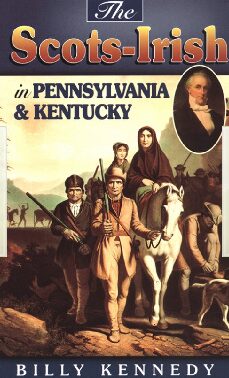Protestant Irish
 From Conservapedia - Reading time: 2 min
From Conservapedia - Reading time: 2 min
The Protestant Irish or Scots-Irish or Scotch-Irish were immigrants from Ireland to America of Protestant background. Most were Presbyterians whose ancestors moved from Scotland to Ireland, especially the northeastern part that is today Northern Ireland. About 250,000 migrated in the period 1710-1770, heading especially to the frontier regions in the South where they were herders and farmers.[1] They were often called "Yeomen". From 1800 to 1860 another 100,000 came to America, while others went to Canada.
They called themselves "Irish"—the term "Scots Irish" came later—and produced such notable politicians as Andrew Jackson (President 1829-37) and James Knox Polk (President 1845-49). After 1850 or so they lost a sense of ethnicity and blended into the general population.
About 45 million Americans are of Irish descent—and a majority are Protestants. Originally most were Presbyterians. Today the largest number are Baptists, followed by Methodists.
Although the Orange Order was strong among Protestant Irish in Canada, it never caught hold in the United States. There were relatively few instances of violence between the Catholic Irish and the Protestant Irish—the most notable being riots in Philadelphia in 1844 and New York City in 1870 and 1871.Presbyterians[edit]
Beliefs and practices that are distinct to American Presbyterians, such as their adoption of democratic principles and pluralism, are described by an article by Noll et al. (2006). The article is divided into three sections, each of which examines an aspect of American Presbyterianism that sets it apart from Presbyterianism in other parts of the world. The first section identifies what Old and New World Presbyterians have in common, and where they have diverged. Section two points to the 1788 revisions to the Westminster Confession - which recognized separate spheres for church and state - as the significant departure that defined American Presbyterians. The final section suggests that strong Irish influences from Ulster helped establish the distinctive American identity.
See also[edit]
Further reading[edit]
- Blethen, Tyler Ulster and North America: Transatlantic perspectives on the Scotch-Irish (1999) online at ACLS History e-book project
- Fischer, David Hackett. Albion's Seed: Four British Folkways in America (1991), major scholarly study tracing colonial roots of four groups of immigrants, Irish, English Puritans, English Cavaliers, and Quakers.
- Glazier, Michael, ed. The Encyclopedia of the Irish in America, (1999), a good place to start—the most authoritative source, with essays by over 200 experts; covers both Catholics and Protestants.
- Griffin, Patrick. The People with No Name: Ireland's Ulster Scots, America's Scots Irish, and the Creation of a British Atlantic World, 1689-1764. (2001)
- Kennedy, Billy. Scots Irish in Pennsylvania & Kentucky (1998) excerpt and text search, popular history
- Lee, J. J., and Marion Casey, eds. Making the Irish American: History and Heritage of the Irish in the United States (2007) excerpt and text search
- Leyburn, James G. Scotch-Irish: A Social History (1989), scholarly survey; good starting point.
- McWhiney, Grady. Cracker Culture: Celtic Ways in the Old South (1989), scholarly interpretation
- Meagher, Timothy J. The Columbia Guide to Irish American History. (2005). online review
- Noll, Mark; D. G. Hart, and Marilyn J. Westerkamp. "What Has Been Distinctly American about American Presbyterians?" Journal of Presbyterian History 2006 84(1): 6-22.
- Webb, James. Born Fighting: How the Scots-Irish Shaped America (2004) by a popular novelist who is now Senator from Virginia; not considered reliable by scholars.
References[edit]
- ↑ Some of these had been Catholic in Ireland but became protestants in America.
 KSF
KSF